I’m all over the place this morning (researching, ad concerns, re-designing) and running late with Wednesday’s (10.6) column. It probably won’t be up until 3 pm Pacific time. If only there two of me…or three of me, for that matter. One could sleep on the couch and the other on a cot in the dining room.
I’m tapping something out about Ray, which I saw last night. Nothing new here, but the rumble is not overblown: Jamie Foxx’s performance as Ray Charles totally kills, and is the exact sort of tour de force dazzler that always seems to appeal to Academy criteria. I almost said to myself last night, “This is it…he’s got the Best Actor Oscar.”
But then I held back when I thought of Paul Giamatti’s morose sad-sack performance in Sideways. The more I reflect on the particulars of his pissed-off junior high-school teacher struggling with a troubled novel, the more affecting it seems, especially given the quality of the film.
If you want to be provincial and small-minded about it, and I’m sorry to be passing these thoughts along, but the fact is that the other apparent contenders have this or that strike against them.
Javier Bardem is moving and dignified in The Sea Inside, but the film is a bit enamoured with the nothingness of death. Liam Neeson in Kinsey gives a beautifully measured performance, but a view that the real-life Kinsey was a creepy perv gained a certain legitimacy from a piece that ran in last Sunday’s New York Times. Kevin Bacon‘s acting in The Woodsman is top-drawer, but the sexual deviancy element is probably going to give some people pause.
I think these guys have all done superb work, but I know how Academy types tend to size things up and categorize, etc.
The fact is that Foxx’s performance, which carries sensitivity and grace but also impresses because it’s a superb impersonation piece, is the only one that conveys that positive uplift theme (a gifted man is beset and nearly undone by his demons, but eventually overcomes them) that always seems to strike a chord.
Alfie-ville
Jude Law’s acting in Alfie (Paramount, 10.22) is the big fulfillment move of his career thus far. It’s the kind of supple and immensely charming performance that presumptive, good-looking movie stars in their prime are supposed to deliver sooner or later. It’s the richest thing Law’s ever done. Between this, Closer and his hilarious work in I Heart Huckabees, he’s really riding high.
I usually hate emotional-bath movies aimed at women and couples, but I liked Alfie a lot, and for substantial reasons.
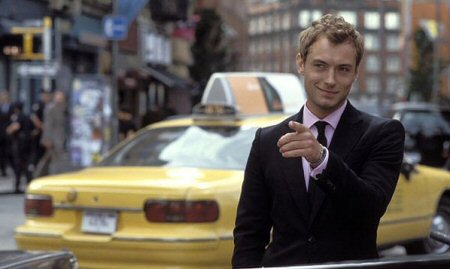
A story about a carefree womanizing louse and his eventual comeuppance, Alfie is a remake of the popular 1966 original, directed by Lewis Gilbert.
The present-day version, directed and co-written by Charles Shyer, isn’t a pretty good remake — it’s better. It retains the things that made the ’66 version grounded and touching, and at the same time is an appealing upgrade.
A 32 year-old Michael Caine made his first big score in playing the lead in the mid’60s version, just as the 31 year-old Law has done here. And he makes a more vivid impression than Caine did.
His Alfie is sexier and more seductive, and at the same time more befuddled and sad-pathetic. He’s a prick, but you can’t help feeling for him. He doesn’t have much of a clue at the finish, but at least is starting to recognize that he needs a bit more humanity.
Law could have gone hammy or too perverse or too cute…but he did it just right. It’s a performance that viewers everywhere are going to get and say, “Yup…really nailed it.”
Law has been Oscar-nominated twice so far — for Best Supporting Actor in The Talented Mr. Ripley and for Best Actor in Cold Mountain — and if it happens again for any one of his six performances this year, it’ll be for Alfie.
Then again the consensus may be that Alfie isn’t dark or heavy enough for Law to qualify. (It is for me, but you never know how these things will shake out.)
The only other possibility is his performance in Mike Nichols’ Closer (Columbia, 12.3), but that’s an ensemble piece — Law’s screen time is said to be roughly the same as costars Julia Roberts, Clive Owen and Nathalie Portman’s — and what he does may not register as a lead.
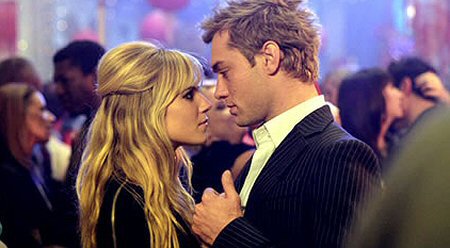
Plus he’s got seven or eight hard competitors — Javier Bardem in The Sea Inside ), Jamie Foxx in Ray, Don Cheadle in Hotel Rwanda, Jeff Bridges in The Door in the Floor, Kevin Bacon in The Woodsman , Paul Giamatti in Sideways, Liam Neeson in Kinsey and Tom Cruise in Collateral. Who knows?
Alfie is a mainstream confection of an unusally high order. It’s not a Jean Pierre Melville or a Robert Bresson film, obviously. It’s a well-funded glossy thing that’s meant to seduce, at least initially. But it doesn’t stay on that level. Inwardly it’s a movie about values, caring, human frailty. And getting to the heart of things. Smooth romantic films funded by big studios rarely have this kind of depth or flavoring.
I said the following in Wednesday’s WIRED item:
“Coming from the director of the schmaltzy Baby Boom, Father of the Bride and I Love Trouble, Alfie feels like some kind of life-change movie.
“The old Shyer movies (which he co-wrote with former wife Nancy) were massage-y and conventional in their audience pleasing ambitions. Alfie obviously intends to please also, but it does so in a much more measured and subtle fashion and without copping out with a feel-good ending (which Shyer was pressured to deliver by Paramount production executives).
“After the failure of Affair of the Necklace, Shyer knew it was do-or-die time…and he did.”

The only other Alfie reaction I’ve read so far is Drew McWeeny’s (a.k.a. “Moriarty”) in Ain’t It Cool News. He agrees with me, or vice versa.
“It would be hard to pinpoint exactly why Alfie feels so different from [Shyer’s] previous work, but there’s no denying that it does,” he wrote in a piece posted ten days ago. “There’s a pulse here, a new sense of vitality, and the result is a sleek, smart slice of adult entertainment that has some real soul amidst the slick.
“This isn’t a film about Alfie solving all of his problems, and it’s not a film about redeeming him and rounding off his rough edges. Instead, it’s just a journey towards some degree of self-recognition.
“When the big-studio romantic comedy is so often used to sell generic happily-ever-after horseshit to us, it feels brave to see someone make one as relentlessly realistic and even pessimistic as this [film]. Oddly, it’s this cad, this bastard, that may finally make Jude Law a full-fledged movie star here in the U.S. He manages to make you care about this guy even at his lowest moments, and there’s something genuinely affecting about watching him struggle for his soul.”
The smart move would be for Paramount to sneak Alfie a week before opening, or two weeks from today.
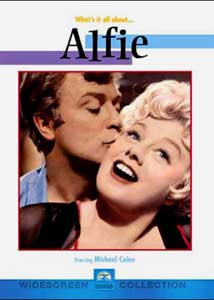
I realize it makes me sound slightly square to be enthusing about this thing, and that a more serious film aficionado would save his greater enthusiasms for the latest Bela Tarr movie instead, but I know good, shrewd filmmaking when I see it, and I know that Shyer has bumped his work up to a higher level.
The costars are Marisa Tomei, Sienna Miller, Nia Long, Susan Sarandon (in the Shelley Winters role), Omar Epps. I wish I knew the name of a kindly white-haired actor whose character bonds with Alfie in two nicely-written scenes.
I was a little scared at first when a pink-tint Paramount logo appeared at the beginning and a echo-y fragment of Dionne Warwick’s singing of the “Alfie” tune (or what sounded like this) on the soundtrack. It felt too girly, but my concerns didn’t last long.
Alfie has one of the most emotionally agreeable end-credits sequences ever composed. (Not that this is necessarily a goal pursued by other filmmakers.) Black-and-white photos of significant behind-the-camera contributors are shown: Shyer, co-screenwriter-producer Elaine Pope, editor Padriac McKinley, production designer Sophie Becher, casting director Mindy Marin, executive producer Shawn Daniel, performer Mick Jagger, etc… and it feels really nice.
The final Alfie barometer, of course, will be whether Variety‘s Robert Koehler likes it or not.
Koehler’s general rep is that of a smart guy who never met an obscure foreign film he didn’t like, and who’d rather take cyanide than give a thumbs-up to a Charles Shyer film. I figure if he goes for it, the rest of the world will follow.
What Happened Was…
John Kerry won the debate last night because of what his body language said, and Bush lost for the same reason on his own end. Words can be rehearsed, edited, sold. But body language tells all, and everybody knows this.
A body-language expert named Sonya Hamlin said as much this morning on MSNBC, and as soon as she explained why, I knew she was right. I could be the biggest Bush guy in the western world….I could be Karl Rove or Matt Stone or Trey Parker, and her judgements would still be correct.
Kerry carried himself with dignity. He never looked irritated or defensive, as Bush did all through the debate whenever Kerry said something he disagreed with.
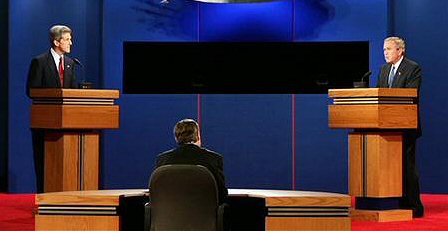
Unlike Bush, Kerry stood up tall and straight and didn’t slump over the lecturn. That little encouraging pat on the right arm that Kerry gave Bush as they shook hands at the very beginning, and the way Bush suddenly broke away before the handshake moment was concluded, was very telling.
Hamlin said that Bush was hurt by the simple fact that Kerry is taller. More of Kerry’s upper body was viewable behind the lecturn, and because of this seemed more stature-esque.
Bush’s petulant, pissed-off expressions obviously showed a lack of substance. I get that he’s a guy who wears his emotions on his sleeve, fine, but this also suggested he’s not accustomed to contrary opinions, and probably lives in a bubble in which he hears what he wants to hear from his advisors.
But I have to be honest: I really enjoyed Bush’s anger moments. His expressions were very, very funny. The second time I watched the debate I was laughing out loud.
Not because I was thinking, “Oh, great…this will help Kerry.” It’s because Bush is a very readable regular-guy type, like any good actor. His discomfort was almost endearing. He looked like some malcontent being scolded by a domineering authority figure. His face said, “Is he serious?…am I really listening to this?…c’mon!”
New York Times columnist Allessandra Stanley wrote that “the cameras demonstrated that Mr. Bush cannot hear criticism without frowning, blinking and squirming (he even sighed once).
“They showed that Mr. Kerry can control his anger and stay cool but that he cannot suppress his inner overeager A student, flashing a bleach-white smile and nodding hungrily at each question. ”
The latest results of a non-scientific MSNBC poll this morning said that 61% of viewer respondents felt Kerry had won, vs. 39% calling it for Bush.
Mein Fuhrer!
I’ve got the old Criterion special-edition laser disc of Dr. Strangelove, and a special-edition DVD from two or three years ago with all kinds of bells and whistles. Now Columbia Tristar Home Video is releasing a two-disc, 40th anniversary edition coming out in a few weeks (on November 2nd…election day!).
I’ll get into a fuller review down the road, but I should proclaim right now that the image is darker and murkier-looking than the previous CTHV Strangelove. And instead of using the proper alternating aspect ratios of 1.33 to 1 and 1.66 to 1 (the look used in the earlier CTHV DVD), the new DVD goes with a 1.85 to 1 crop, which pointlessly lops off visual information from the tops and bottoms of the frame.
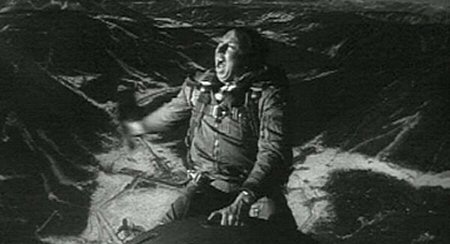
There’s a fascinating snafu contained in a video interview with Robert S. MacNamara, Secretary of Defense under Presidents Kennedy and Johnson in the `60s and star of Errol Morris’ Oscar-winning The Fog of War.
The astonishing mistake is….the camera jiggles. McNamara is being asked about what it was like living under a nuclear Sword of Damocles ever day, and someone bumps into the camera tripod. Thump…jiggle…what happened? This kind of thing never makes the final cut of a taped interview. It was kept in because there wasn’t time to re-do anything because they were on a clock that McNamara had insisted upon.
There’s a new documentary called “No Fighting in the War Room or: Dr. Strangelove and the Nuclear Threat.” It includes talking-head interviews with McNamara, author Bob Woodward, Roger Ebert and Spike Lee, and is fairly interesting. It’s playing as I write this, but I can’t really watch it because the column needs to be up in an hour.
There’s also a doc called “Best Sellers: Peter Sellers Remembered.” I watched about five minutes’ worth and it seems reasonably smart and perceptive.
What I really want from a Dr. Strangelove DVD but will never get is (a) lost footage of the climactic pie-fight sequence in the War Room that was shot but never used by director Stanley Kubrick, and (b) 16mm color behind-the-scenes footage. That’s what I want. I know the pie-fight sequence didn’t work, etc., but I want to see it anyway.

One of the funniest moments in Dr. Strangelove is a slip-up. Go to the famous scene in which the wheelchair-bound Dr. Strangelove (Peter Sellers), a German scientist based on Dr. Werner von Braun, is fighting with his prosthetic arm, which has a sporadic tendency to give “seig heil!” salutes all on its own.
As Sellers tries to overcome the arm by beating on it, Peter Bull, the actor playing the Russian ambassador and who’s standing right behind Sellers, breaks character by smiling. He nearly starts laughing, but he checks himself. This is an absolute no-no, of course. However, Bull’s face was heavily shadowed and Kubrick probably figured all eyes would be on Sellers at that moment. But it’s a fairly glaring error, especially for a film made by a legendary control freak.
Break Your Heart
As long as we’re on a political jag, I’m recommending RFK , a two-hour documentary about the life and times of Robert F. Kennedy. It airs on PBS next Monday evening (10.4) at 8 pm.
Directed by David Grubin (who did LBJ, a superb four-hour documentary about the tragedy of Lyndon Johnson, for PBS’s “The American Experience” roughly fourteen years ago) and produced by Grubin and Sara Colt, RFK has the earmarks of a penetrating emotional experience. Translation: a good cry.
Check out the RFK website. It’s got a teaser, bios, a synopsis, a transcript…everything.
This new biography features interviews with historians, journalists and biographers, including Robert Dallek, Anthony Lewis, Jeff Shesol, and Ronald Steel, and the first-hand recollections of those who knew him well: Peter Edelman, Richard Goodwin, Nicholas Katzenbach, John Seigenthaler, Adam Walinsky, Jack Newfield, Roger Wilkins, and Harris Wofford.
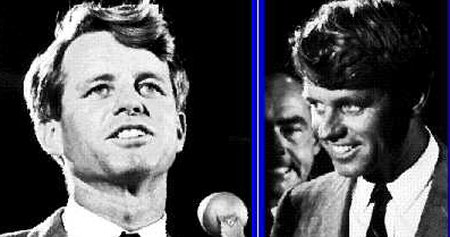
I love this line about Kennedy, written by one of his biographers: “He was brave precisely because he was fearful and self-doubting.”
“RFK is a story about change and suffering,” Grubin writes on the site. “Robert Kennedy not only changed his mind about the great issues of his day — civil rights and the war in Vietnam — he changed himself. I wanted to explore his enormous capacity for growth and its relationship to the death of his brother, clearly the defining moment in his life.”
The titles of the hour-long sections are “The Garish Sun” and “The Awful Grace of God.”
The latter title is from a quote by Aeschylus: “He who learns must suffer. And even in our sleep pain that cannot forget falls drop by drop upon the heart, and in our own despair, against our will, comes wisdom by the awful grace of God.”
Right Thinkers
“If you’ve followed South Park without missing an episode, as I have, you would have noticed Republican talking points popping up several hundred times.
“Matt Stone and Trey Parker seem to have a problem with anyone who’s an environmentalist. They rag on global warming every now and then. SUV’s are good. Unregulated Corporations ditto. Dumping waste in Third World countries is great. So is cutting down rain forests and destroying sundry wildlife. But people from Mexico coming across the border are bad.
“And they have this weird Rob Reiner food-eating fetish which manifests itself on several occasions. As far as I can tell Reiner just a harmless ol’ guy who raises money for several worthwhile causes. But he’s a Democrat, so he needs to be skewered. Barbara Streisand isn’t a royalist plutocrat like Newt Gingrich, so she gets the short end of the schtick. The Baldwins get killed in the South Park movie, and on and on.
“It’s interesting that no one from the Hollywood Republican section ever lands on their shit list. No Arnold, no Bruce Willis, no Kevin Costner, no Shannen Doherty, no Chuck Norris, no Freddie Prinze Jr., no Jessica Simpson. Oh, they did do a really good hatchet job on Mel Gibson turning him into some sort of fanatical sado masochist wacko. Which in their minds probably balances out the rest of their right-wing gibberish.
“But Cartman’s a really funny fat boy. There’s also Jimmy, Butters, Mr. Mackey’s mmkay, Mr. Garrison and Mr. Hat and Mr. Slave, Officer Barbrady and Marlon Brando and his sidekick from The Island of Dr. Moreau. So you’ve gotta give them at least that.” — Vinod Narayanan
“As a longtime fan of South Park, I have to agree with you about their right-leaning ways. The celebrities they’ve attacked on the show have been people like Strisand, Rob Reiner, and Ben Affleck, all pretty famous liberals. My problem with their attacking both sides is they don’t have to choose sides. If you’re making fun of everything, you don’t have to take a stand on anything. — Alan Dingham.
“Parker and Stone are barely closeted righties–and more closeted by people’s perceptions (anti-censorship satirists must be lefties!) than any real hiding on their part.
“I believe they’ve identified themselves as Republicans in past interviews (more in passing, I think, as it was during the Clinton years). You can see some of that coming through on South Park –a funny show, but one I’ve sometimes had trouble stomaching because of those conservative undercurrents. Not because all satire needs to be from a liberal point of view for me to enjoy it, but because sometimes Parker and Stone can unbearably smug.
“I’ll certainly see Team America, but I’ve felt wariness for awhile now, based on what looks to be a torrent of /celebrities should just shut up!’ jokes. Which–as you seem to realize — are not inherently funny, and far from clever.” — Jesse Hassenger.
Eddie and the Thugs
“I second the motion for a The Friends of Eddie Coyle DVD. I finally managed to tape a censored version of the movie on AMC a couple of months back and quickly became obsessed with it. I ended up watching it it three or four times to catch all of the nuances, and then read George Higgins’ classic novel.
“This is the most realistic look at low-level criminals ever made, and maybe the purest example of how different the studios were in the ’70s. Is there even one remotely attractive or heroic character in that film? Everybody, from the cops to the criminals, is run-down, depressed or a mercenary desperate just to grapple to the next low rung in the ladder.
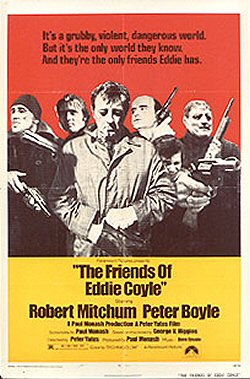
“And I love how the film just ends, with no catharsis or hope, just the implied question (as written in the book): `Is there any end to this shit?’
“Eddie Coyle is the rarest kind of film that makes absolutely no contrived concessions to entertain the audience, yet there’s some intangible quality to it that makes the movie lodge into your memory.
“A lot of that probably has to do with atmosphere. I worked in the South Shore of Massachusetts (the movie’s milieu) one winter and Victor Kemper’s cinematography really captures the bleak, lonely ambience of the cold months there. Let’s hope the eventual DVD producers don’t skimp on the transfer.
“And for perhaps the only time in movie history, the Boston accents in the film aren’t the kind to make New England viewers wince.
“I initially started thinking that a re-make is in order (I’m sure Tarantino would really sink his hooks into the story’s low-life characters), but screw it — the original is damn-near perfect. ” — Chris Pizzello
